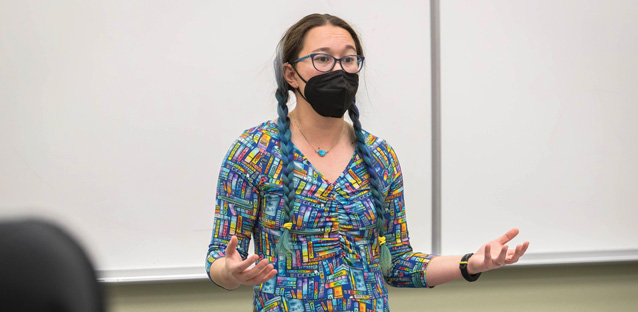Sparking Student Interest in STEM
New program seeks to attract and retain students in STEM and open doors to a more diverse, equitable and inclusive workforce.
As the departments of Anthropology, Earth Sciences and Geography, GIS and Sustainability seek to address challenges and barriers to equity in science, technology, engineering and mathematics (STEM) fields, several faculty are working across disciplines to help students in STEM majors.
Chelsie Romulo, Ph.D., a professor of Environmental and Sustainability Studies; Sharon Bywater-Reyes, Ph.D., a professor of Earth and Atmospheric Sciences; and Andy Creekmore, Ph.D., the chair and a professor of Anthropology created “AGES,” an acronym for Anthropology, Geosciences, and Environmental Sustainability. They worked to make the program inclusive and student-centered by providing hands-on learning, research and outreach opportunities, and student support and development opportunities.
The program will attract students to STEM classes as they start choosing academic majors and aims to attract first-year and transfer students, but all students are welcome to participate.
The need for STEM-educated graduates is rising, and studies have long shown a lack of diversity in the field. Between 2017 and 2029, STEM careers are expected to grow almost 9%, according to the U.S. Department of Labor, yet the majority of the workforce in STEM-related fields are white men. According to 2019 data from the U.S. Census Bureau, women constituted only 27% of the STEM workforce.
A study published in the journal Education Researcher shows that 40% of Black students and 37% of Latinx students abandon their STEM majors before earning a degree, and they are less likely to have adequate financial and academic resources to complete their degrees. Similarly, in the American Educational Research Journal, another study finds that discrimination and bias could be pushing women and students of color away from STEM fields.
“Solving world problems is going to take teams from multiple disciplines, so we’re addressing two main needs: getting students to work in interdisciplinary teams right away and having a more diverse student-faculty cohort to increase diversity,” said Romulo. “There are different paths into our programs, and also paths out of our programs. It’s beneficial for everybody if students have exposure to socio-environmental problem solving.”
Reaching students early in their academic journey helps them explore STEM options and provides support along the way. This fall, 24 students have registered for three classes within the AGES program. These students earned three of their required liberal arts core courses for graduation while benefiting from additional academic support and meeting like-minded students to attend social events with.
The cohort learning model helps students find a sense of belonging at UNC, which is critical for retention and graduation rates.
“Our biggest concern is losing students who feel as if they don’t fit in at UNC and don’t have other options in pursuing STEM-related academics. We want to cultivate a sense of belonging at UNC and connect students with support on campus that they may not know about, such as the Center for Career Readiness, mental health services, cultural centers and more,” Romulo said. “We designed the schedule specific to their location, and, during breaks between classes we’ll have options for them to meet with campus resources so they can benefit academically and socially.”
The AGES program uses multiple, broad paths to build the cohort versus specifically focusing on one pipeline built around one program. The program also focuses on developing skills outside of the classroom that will help prepare students professionally, as AGES students problem-solve by implementing methods to test for different solutions. They’ll spend time in the field and become familiar with technologies by using drones, water-monitoring equipment, ground-penetrating X-ray equipment, field trips and more. Such technologies are used to gather and analyze data in order to prove or disprove hypotheses.
This past May, students from different UNC STEM programs were able to do field work on a river-camping trip along the Yampa River. They not only conducted research but also bonded over the shared experience.
“I imagine we’ll have more of these field classes that are optional for any of these majors to come on,” Romulo said. “It’s a great way to end your academic experience before your last year at UNC. We were together on the river for a week, and it was amazing and everyone learned so much, not just academically, but from one another, too.”
Romulo, Bywater-Reyes and Creekmore are continuously searching for unique ways to spark interest in prospective students as well as provide engaging, hands-on learning experiences. They encourage opportunities for UNC alumni to become involved, such as supporting students attending STEM-related events on campus, or sitting on an Alumni Career Panel to mentor students about pursuing STEM careers.
“We want to solve environmental problems and make sure that we have a nice place to live in the future,” Bywater-Reyes said. “We need people in these disciplines, so that’s another big motivation. In addition to saving the world, we’re also supporting students. It’s nice that we can do this at the same time.”
–By Katie-Leigh Corder


